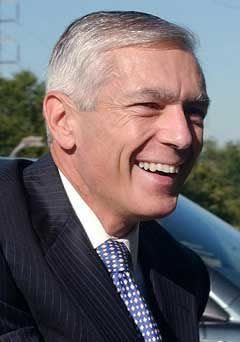'Never been so worried about our future.' Clark supports more military aid to Ukraine
- Oops!Something went wrong.Please try again later.
The United States should ramp up its military aid to Ukraine to prevent its conquest by Russia, retired General Wesley Clark, told a packed audience a week ago last Thursday at Hiram College.

One of the most brilliant American military leaders of his generation, Clark warned a prolonged war favors Russia. Russia, he said, has four times Ukraine’s population and a much larger industrial base. He said Russia is rebuilding its military and its performance, heretofore terrible, will improve in the long run.
He said America needs to send tanks and armaments to Ukraine and a defensive air system that can intercept Russian missiles and drones. Russian President Vladimir Putin, he said, may use limited nuclear weapons in trying to defeat the Ukrainians, but America must not be deterred.
The general warned of dire consequences if America falters. Europe, he said, looks to the United States for leadership. He predicted a victorious Russia would attempt to conquer other former Soviet Union satellites and pointed on a map to Moldavia, a small country next to Ukraine, as a likely target of Russian expansionism. If America does not remain firm, Europe’s nations will lose heart, drift away, and become more accessible to Russian and Chinese influence, Clark said.
“We are at an inflection point, and I have never been so worried about our future,” the general declared. He said America’s primary foreign policy goal must be the security of the nations of Europe, “with whom we have shared values. The future of democracy is a stake.”
Clark, in his nearly two-hour presentation, reviewed American foreign policy since the break-up of the Soviet Union in 1992. He characterized it as at times complacent, misdirected and undermining the credibility of the United States.

He said the 1990s after the Soviet Union’s dissolution brought complacency to America because it had no rivals capable of endangering it. Then came the terrorist attack of September 11, 2001.
Rather than focusing on pursuing Osama bin Laden and Al-Qaeda in Afghanistan, the Bush Administration decided to invade Iraq, “mostly because they did not like the country’s leader, Saddam Hussein, who had tried to kill Bush’s father.” It had nothing to do with the terrorist attack, but the Bush Administration, Clark said, “wanted to show the world we were tough.”
The upshot, he said, was America looked ignorant and foolish. Its invasion of Iraq needlessly killed 4,500 Americans, hundreds of thousands of Iraqis, and displaced five million Iraqis from their homes. He said a smaller concurrent invasion of Afghanistan ground on and became a 20-year occupation that ended with a ragtag pullout by the Biden Administration.
“We are not good occupiers,” he said.
The effort by the Bush Administration to look tough was followed by the Obama Administration’s lowering America’s profile in the Middle East, which the general said looked weak. The Obama Administration pulled out of Iraq in 2011. Iraq by then had come under the influence of Iran.
He said Obama’s failure to make good on his threats to Syrian President Basha Al-Assad to not use chemical weapons, showed an America lacking resolve. Obama’s pivot to the Pacific was an invitation for Putin to resuscitate its old Cold War era military base in Syria from which Russia could undermine America’s standing in the Middle East, Clark said.
Presidential candidate Mitt Romney’s characterization of Russia as America’s top geopolitical foe in 2012 was accurate, the general said. Romney was ridiculed by Obama who said Russia was no longer a significant threat.
The general said China is watching American determination in Europe because it wants to conquer Taiwan, a prosperous democracy, and rejoin it politically to mainland China. If America’s commitment to Ukraine stalls, it will encourage China to invade Taiwan, which, Clark said, is expected to happen within the next four years.
He said Iran is helping Russia’s invasion of Ukraine to undermine America’s standing, solidify its relationship with Assad’s Syria, and give it a path to attack Israel.
“We need regime change in Iran,” he said, but cautioned that any change must come from Iranians and not from U.S. troops on the ground. America, he said, should sponsor Iranians who want to overthrow Iran’s theocratic government led by the mullahs.
At home, he said, the United States needs to revitalize its manufacturing base and bring good jobs back to America. Letting American jobs relocate to low-wage countries without fighting back has been the practice of every Congress and every President since Ronald Reagan, Clark said. Stockholders, investors, and owners have been enriched, but America’s middle class has been impoverished, he said.
“We have had 40 years of Reaganism,” he said. “It is time for a change.”
David E. Dix is a retired publisher of the Record-Courier.
This article originally appeared on Record-Courier: General Wesley Clark sounds alarms on American foreign policy

